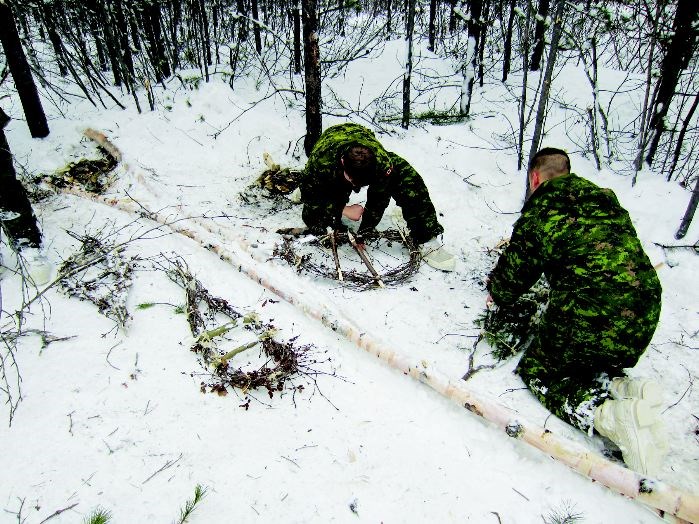Hunkered down tonight in the snows just north of Prince George are soldiers from B.C. and the U.S., learning from the local environment how to survive in the
wilderness.
Capt. Steven Parker, commander of the B.C. Canadian Ranger Company, thinks the 20-plus trainees are thankful they set off on their test excursion at the end of this week instead of last week when prep crews arrived to set up the
exercise.
When the personnel from the 4th Canadian Rangers Patrol Group assembled last week at Whiskers Point just south of Mackenzie, the snow and the mercury were both dropping severely. Water pipes froze at the small resort there, diesel lines in their vehicles gummed up and those about to head off into outdoor survival exercises were feeling some trepidation.
"By the time I got there, I was wondering what they were whining about," said Parker, who arrived just as the weather turned favourable.
The Canadian Rangers are a non-combat subdivision of the nation's army reserve. Canadian Rangers (not to be confused with the Rocky Mountain Rangers based in Prince George which is full combat group, and a different branch of the army reserves) are civilians who are trained by the Canadian Forces in various outdoor skills for the purposes of coastal/ultra-rural surveillance, search and rescue. For the exercises going on based at Whiskers Point, they are doing the training and supervision over regular army soldiers who are getting up to speed on some of these skills.
"We have a skill set among the Rangers that is often lost to the regular army," Parker said. "We are more rural in our background, more in touch with the wilderness, and we operate a lot within our survival skills. Recruits for the regular army these days tend to be city people."
Whiskers Point has been used for the past three years by the Canadian Rangers, without much public fanfare. Parker said it provided the austere setting to authenticate the training, but was close enough to civilization to maximize safety.
The U.S. National Guard had two soldiers in this session, plus 21 from Canada's 39 Brigade Group. They began by spending a day studying theory, a day practicing the fundamentals, then three days in small groups surviving in the wilds beyond McLeod Lake. They are out there tonight on that mission.
"I spoke to a couple of soldiers who told me that before they arrived, they would have panicked over the cold and isolation, but with the training already behind them they felt confident and excited to go out there and put it to use," said 2nd Lt. Ian Carter, spokesman for B.C.'s Canadian Rangers.
The Canadian Rangers has 24 patrols in B.C., each one based in a small town and made up of about 20 people. Mackenzie has one, as does Valemount, 100 Mile House and Vanderhoof. Parker said it was against general policy to recruit members to these patrols from more than an hour's drive away, or from areas where another reserve unit exists, but because Prince George has only had the army for a short time there were already 12 local people joined up and working with the Vanderhoof group.



